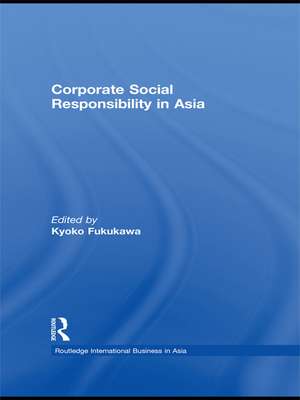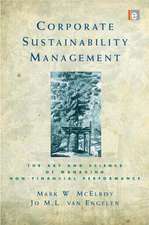Corporate Social Responsibility in Asia: Routledge International Business in Asia
Editat de Kyoko Fukukawaen Limba Engleză Paperback – 24 mar 2011
| Toate formatele și edițiile | Preț | Express |
|---|---|---|
| Paperback (1) | 408.54 lei 6-8 săpt. | |
| Taylor & Francis – 24 mar 2011 | 408.54 lei 6-8 săpt. | |
| Hardback (1) | 1162.84 lei 6-8 săpt. | |
| Taylor & Francis – 28 oct 2009 | 1162.84 lei 6-8 săpt. |
Din seria Routledge International Business in Asia
-
 Preț: 305.61 lei
Preț: 305.61 lei -
 Preț: 388.85 lei
Preț: 388.85 lei -
 Preț: 461.86 lei
Preț: 461.86 lei -
 Preț: 410.28 lei
Preț: 410.28 lei -
 Preț: 303.33 lei
Preț: 303.33 lei - 18%
 Preț: 1277.27 lei
Preț: 1277.27 lei
Preț: 408.54 lei
Nou
Puncte Express: 613
Preț estimativ în valută:
78.18€ • 81.32$ • 64.55£
78.18€ • 81.32$ • 64.55£
Carte tipărită la comandă
Livrare economică 14-28 aprilie
Preluare comenzi: 021 569.72.76
Specificații
ISBN-13: 9780415673044
ISBN-10: 0415673046
Pagini: 186
Ilustrații: 12 b/w images, 10 tables and 12 line drawings
Dimensiuni: 156 x 234 x 10 mm
Greutate: 0.27 kg
Ediția:1
Editura: Taylor & Francis
Colecția Routledge
Seria Routledge International Business in Asia
Locul publicării:Oxford, United Kingdom
ISBN-10: 0415673046
Pagini: 186
Ilustrații: 12 b/w images, 10 tables and 12 line drawings
Dimensiuni: 156 x 234 x 10 mm
Greutate: 0.27 kg
Ediția:1
Editura: Taylor & Francis
Colecția Routledge
Seria Routledge International Business in Asia
Locul publicării:Oxford, United Kingdom
Public țintă
Postgraduate, Professional, and UndergraduateCuprins
1. Social Paradigms in China and the West 2. Structural Change in Corporate Society and CSR in Japan 3. Perceptions of CSR and its Adoption to Business Practice in the Thai Context 4. A Multilevel Assessment of Corporate Social Responsibility Disclosure in Malaysia 5. Exploitation of Labor in Bangladeshi RMG Sector: Who is responsible? 6. CSR – a Virtuous Circle. But Which Circle? And Whose ‘Virtue’?
Recenzii
The editor of this collection concludes her introduction by remarking that "This book hopes to offer - if only in a very modest fashion - something towards the development of a new 'world literature' on CSR". One can only congratulate her for hitting the nail right on the head. The essays reflect the editor's commitment to pluralism, pragmatism and a deeply respectful appreciation of the complexity of individuals and communities. In a world in which oversimplification is celebrated nearly as much in the world of scholarship as in broadcast media, it is refreshing to read a manuscript that celebrates complexity. Fukukawa's collection is a fine contribution to understanding the variety of forms of CSR across our planet and the importance of drawing on this rich resource to create a sustainable system of trade for all the planet's inhabitants.
Alex C. Michalos, Ph.D., F.R.S.C.
Chancellor
Director, Institute for Social Research and Evaluation
Professor Emeritus, Political Science
University of Northern British Columbia
Editor-in-Chief for Journal of Business Ethics
*********************************************************************
Two of the rising BRIC economies of the twenty-first century are in the Asia-Pacific region. India is the world's largest democracy; China is the largest country in the world and totalitarian and increasingly dominating the global economy; Russia and Brazil are struggling to shape their destinies as very different democracies. In the meantime Japan, still the world's second largest economy, is trying to maintain its economic and intellectual dominance. All Asian economies present different CSR perspectives shaped by their colonial and non-colonial experiences, and by their ethnic and religious diversities. This is a very useful and timely book, edited by one of the growing scholars in this area who has collected a great range of writers in one volume. A 'must-buy' for anyone interested in CSR, capitalism and sustainable enterprise in the 21st century.
Malcolm McIntosh
Professor of Sustainable Enterprise, Asia-Pacific Centre for Sustainable Enterprise, Griffith Business School, Brisbane, Australia.
*********************************************************************
Dr Fukukawa has put together a book that delivers far more than it promises. Upon seeing the title, I expected a delineation of CSR in Asian countries and how it differs from practice in the West. Indeed, it does this, at least for five countries, but it also re-visits the very basic questions of what is the purpose of CSR and what should it be, as well as what should be the relationship between business and society in today’s “hot, flat, and crowded” world. The book is a must read for all of us who have a serious interest in the philosophy and practice of CSR.
Edmund R. Gray
Professor of Management and Chair of the Department of Management, Loyola Marymount University, USA.
*********************************************************************
Recently CSR has become so widely accepted and so rarely questioned, that we risk losing sight of its origins and implications. For Asian companies, the Western values and philosophies that underpin conventional CSR thinking are different to those from their own cultures and traditions. The implications of this simple observation, in an increasingly globalized business world, have barely begun to be explored by researchers. This book pulls together a range of expert contributions to reveal how an appreciation of CSR from an Asian perspective may be the key to a more ethical and sustainable global economy in the 21st century.
Professor Ken Peattie, Director, BRASS Research Centre, Cardiff University.
Alex C. Michalos, Ph.D., F.R.S.C.
Chancellor
Director, Institute for Social Research and Evaluation
Professor Emeritus, Political Science
University of Northern British Columbia
Editor-in-Chief for Journal of Business Ethics
*********************************************************************
Two of the rising BRIC economies of the twenty-first century are in the Asia-Pacific region. India is the world's largest democracy; China is the largest country in the world and totalitarian and increasingly dominating the global economy; Russia and Brazil are struggling to shape their destinies as very different democracies. In the meantime Japan, still the world's second largest economy, is trying to maintain its economic and intellectual dominance. All Asian economies present different CSR perspectives shaped by their colonial and non-colonial experiences, and by their ethnic and religious diversities. This is a very useful and timely book, edited by one of the growing scholars in this area who has collected a great range of writers in one volume. A 'must-buy' for anyone interested in CSR, capitalism and sustainable enterprise in the 21st century.
Malcolm McIntosh
Professor of Sustainable Enterprise, Asia-Pacific Centre for Sustainable Enterprise, Griffith Business School, Brisbane, Australia.
*********************************************************************
Dr Fukukawa has put together a book that delivers far more than it promises. Upon seeing the title, I expected a delineation of CSR in Asian countries and how it differs from practice in the West. Indeed, it does this, at least for five countries, but it also re-visits the very basic questions of what is the purpose of CSR and what should it be, as well as what should be the relationship between business and society in today’s “hot, flat, and crowded” world. The book is a must read for all of us who have a serious interest in the philosophy and practice of CSR.
Edmund R. Gray
Professor of Management and Chair of the Department of Management, Loyola Marymount University, USA.
*********************************************************************
Recently CSR has become so widely accepted and so rarely questioned, that we risk losing sight of its origins and implications. For Asian companies, the Western values and philosophies that underpin conventional CSR thinking are different to those from their own cultures and traditions. The implications of this simple observation, in an increasingly globalized business world, have barely begun to be explored by researchers. This book pulls together a range of expert contributions to reveal how an appreciation of CSR from an Asian perspective may be the key to a more ethical and sustainable global economy in the 21st century.
Professor Ken Peattie, Director, BRASS Research Centre, Cardiff University.
Descriere
This book examines the theory and practice of Corporate Social Responsibility (CSR) in countries across Asia, including China, Japan, Malaysia, Thailand and Bangladesh, providing much needed Asian perspectives on this important issue. Arguing that Western CSR has enjoyed limited effectiveness, it asks whether Asia can avoid the West’s mistakes.















